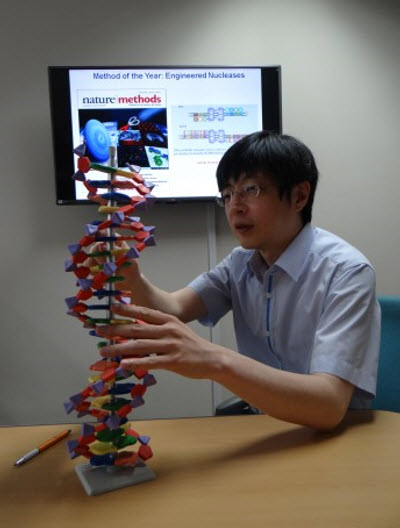
Professor KIM Jin-Soo
In 2015, Professor Jin-Soo Kim of the Department of Chemistry and Director of the Center for Genome Engineering in the Research Institute of Basic Sciences, successfully edited the DNA of lettuce using the CRISPR-Cas9 “DNA scissors.”
The CRISPR-Cas9 “DNA scissors” technique was a breakthrough in the field of microbiology. It allows scientists to target specific genes in a DNA strand and edit parts of the genome by cutting, removing, adding sections of the DNA sequence. The two key molecules in the CRISPR-Cas9 system that modify the DNA are the Cas9 enzyme, which cuts the strands of DNA at a specific location in order to add or remove sections, and the guide RNA (Ribonucleic acid), which finds and binds to a specific sequence in the DNA. With various RNA types, any DNA can be cut. The CRISPR-Cas9 system is simple – any researcher with knowledge of molecular biology will be able to learn the method in just a couple of months.
This method has been implemented in the food industry, with an article from the New York Times on January 9 reporting that “hundreds of acres of gene-edited crops have already been grown […], unencumbered by oversight or regulations,” and that “in a few years, you could be eating the next generation of genetically altered foods.”
Produce that has already been created using the CRISPR-Cas9 method include soybeans that no longer produce harmful trans fat, but instead produce a healthier mix of fatty acids, potatoes that do not turn brown after removing their skin, mushrooms that live longer than their usual life expectancy, and corn with kernels that do not soften.
Cellectis - a biopharmaceutical company whose chairman and CEO André Choulika stated that “genetically edited vegetables will be the staple diet of 21st century humanity” - plans to mass-produce these products next year. According to the New York Times, Cellectis hosted a dinner at the Alain Ducasse Manhattan restaurant (Benoit New York) in October, and served dishes made from its gene-edited soybeans and potatoes. “Guests included professors, journalists and celebrities like Neil Patrick Harris, the actor.”
Professor Kim edited the DNA of the plant hormone that controls the growth rate of the lettuce in order for the plant to develop a tolerance for pests and drought. Professor Kim said that “besides lettuce, they have already succeeded in editing the DNA of tobacco and rice,” and are “currently developing various types of enzymes and researching ways to improve the degree of precision.”
Choulika claims that genetically edited vegetables are different from GMOs (Genetically Modified Organisms). GMOs have their DNA modified using bacteria to expose the desired trait, but this is problematic because DNA from the bacteria may remain in the plant during the modification process. There are risks involved as it is a process that cannot occur naturally. Although side effects or problems have yet to be reported, many countries in Europe have prohibited the cultivation of GMOs. CRISPR organisms have no health controversies like GMO does, which is what gains its traction in the world today. In the CRISPR-Cas9 method uses only the DNA of the plant itself.
CRISPR also has an advantage in that the “scissors” can cut specific desired sections of the DNA, meaning that plants with any desired characteristic can be produced simply by knowing the roles of each DNA strand. Unlike GMOs, CRISPR plants have yet to be regulated in countries such as the United States, England, and China.
The CRISPR scissors have also been used in the animal industry. Professor Kim collaborated with Professor Xi-jun Yin of Yanbian University (Yanji, China) to produce ‘double-muscled’ pigs, which bear significantly greater muscle mass than usual pigs. Using DNA scissors, the research team headed by Professors Kim and Yin cut the myostatin gene (MSTN), which inhibits the growth of muscle cells beyond a certain amount. These ‘double-muscled’ pigs have higher protein content and less fat.
Other modified animals have been produce such as sheep with different colours of wool, which would make the process of dyeing wool no longer necessary.
Professor Kim said that “Korea has excellent technological ability for DNA editing, but the government is not actively supporting it, and there are not many companies that have taken the lead in using these products.” He further added, “regulations that treat these products as GMOs have to be lifted in order to compete with countries such as the United States and China.”
Written by Hye Bin Lee, SNU English Editor, hahahybes@snu.ac.kr
Reviewed by Professor Travis Smith, Department of Asian Languages and Civilizations, tlsmith@snu.ac.kr

